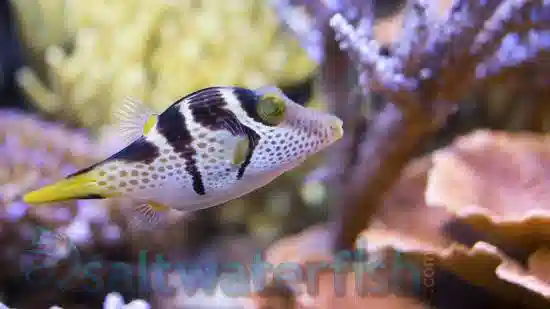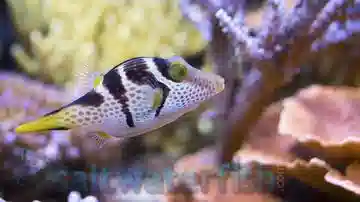Valentini Puffer
Canthigaster valentini
(15 Reviews)

Valentini Puffer
Canthigaster valentini
(15 Reviews)
{{ item.name }}
Size: {{ item.extra_field_3 }}
${{ getFormattedPrice(item.saleprice) }} ${{ getFormattedPrice(item.price) }}
To join the waiting list, click here
Free Shipping
With
$199.00
or more in Marine Life.
More details...
Valentini Puffer Care Facts
| Care Level: | Easy |
|---|---|
| Temperament: | Semi-Aggressive |
| Diet: | Carnivore |
| Reef Safe: | No |
| Minimum Tank Size: | 30 gallons |
| Max Size: | 4 inches |
Valentini Puffer (Canthigaster valentini) Care & Upkeep in Your Aquarium
Welcome to our detailed guide on the care and maintenance of the Valentini Puffer, scientifically known as Canthigaster valentini. This comprehensive guide will provide essential information for successfully keeping the Valentini Puffer in your saltwater marine aquarium. We will cover habitat, reef compatibility, size, lifespan, dietary needs in captivity, aquaculture and availability, compatibility with other marine species, sexual dimorphism, juvenile to adult coloration changes, temperament, tank requirements, and specific water conditions. Additionally, we will introduce common names by which this species is known and recommend five compatible tank mates. We will also discuss the advantages of acquiring your Valentini Puffer from Saltwaterfish.com.
Habitat of Valentini Puffer
The Valentini Puffer, Canthigaster valentini, originates from various parts of the Indo-Pacific region. These puffers are typically found in coral reefs, lagoons, and coastal waters, seeking shelter among rocks, corals, and crevices.
Reef Compatibility of Valentini Puffer
The Valentini Puffer is considered semi-reef safe. While they usually do not harm corals, they may nip at or consume some invertebrates, such as ornamental shrimp or small, delicate species of ornamental clams. Therefore, caution is advised when introducing them to a reef aquarium.
Size and Lifespan of Valentini Puffer
Valentini Puffers are relatively small, growing to a maximum size of about 4 inches (10 centimeters). In terms of lifespan, these puffers can live up to 5 years in optimal conditions.
Diet in Captivity: What Do Valentini Puffers Eat?
In captivity, Valentini Puffers are carnivorous and have specific dietary needs. Their diet should consist of meaty foods such as marine-based flakes, pellets and frozen foods like brine shrimp, mysis shrimp, and chopped seafood. Providing them with a balanced diet is essential to maintain their health.
Aquaculture and Availability of Valentini Puffer
Valentini Puffers are not available through aquaculture. They are more commonly collected from the wild. Buying from reputable sources that promote ethical and sustainable collection practices is essential when acquiring Valentini Puffers. At Saltwaterfish.com, we prioritize the species' well-being and ensure proper acclimation to aquarium life.
Compatibility with Other Fish and Invertebrates
Valentini Puffers are generally peaceful and can be housed with other non-aggressive species. However, they may show territorial behavior towards their kind and other puffer species. When selecting tank mates, choose peaceful and larger species less likely to provoke aggression. Monitoring their interactions is crucial to prevent any issues.
Sexual Dimorphism of Valentini Puffer
Valentini Puffers do not exhibit significant sexual dimorphism, as males and females share similar physical characteristics and coloration.
Juvenile to Adult Coloration Changes of Valentini Puffer
Juvenile Valentini Puffers typically have striking brown and yellow coloration with distinctive black spots. As they mature into adulthood, these spots may become less pronounced but still contribute to their unique appearance.
Tank Requirements for Valentini Puffer
To ensure the well-being of your Valentini Puffer, provide a tank with a minimum size of 30 gallons (approximately 114 liters). Maintaining stable environmental conditions is essential. The ideal parameters include a pH of 8.1 to 8.4, a salinity level of 1.020-1.025, and a water temperature range of 74-78°F (23-26°C). Adequate water flow is recommended, and a well-structured tank with hiding spots and live rock mimics their natural habitat, providing essential shelter and territory.
Common Names for Valentini Puffer
The Valentini Puffer is also commonly referred to as the Black Saddle Toby.
Five Compatible Tank Mates with Valentini Puffer
Here are five suitable tank mates to consider when housing Valentini Puffers:
- Firefish Goby (Nemateleotris species)
- Yellow Watchman Goby (Cryptocentrus cinctus)
- Coral Beauty Angelfish (Centropyge bispinosa)
- Cleaner Shrimp (Lysmata amboinensis)
- Royal Gramma (Gramma loreto)
Why Choose the Valentini Puffer from Saltwaterfish.com
Acquiring your Valentini Puffer from Saltwaterfish.com assures healthy and acclimated specimens. We prioritize ethical sourcing and the well-being of marine species, making us a trusted choice for marine enthusiasts.
In summary, with its captivating appearance and peaceful disposition, the Valentini Puffer is a delightful addition to your saltwater marine aquarium. By providing proper care, a balanced diet, and a suitable tank setup, you can enjoy their unique presence for years to come.
So far so good
Reviewed by: Paul Krumm on May 20, 2025
Beautiful
Reviewed by: Jeremiah Johnston on April 13, 2025
Stunning
Reviewed by: Jeremiah Johnston on April 1, 2025
Reviewed by: Spencer Goff on March 5, 2025
Reviewed by: Shawn Dickerson on Dec. 12, 2024
Reviewed by: Thomas Knott on Dec. 7, 2024
Has acclimated great
Reviewed by: Jose Lara on Dec. 1, 2024
Great
Reviewed by: Paul Krumm on Nov. 25, 2024
Reviewed by: Javier Gonzalez on Nov. 3, 2024
Beautiful fish
Reviewed by: Maria Robles on Sept. 25, 2024
Reviewed by: Maria Robles on May 12, 2024
Cute. Shy little guy . Comes out at night
Reviewed by: David Schneider on March 12, 2024
Reviewed by: Charles Kunz on Jan. 23, 2024
Reviewed by: Jeremy Goodman on Nov. 20, 2023
I have lot of fun to watching what he is doing, I am going to say, this fish is need to have. I know he is not pretty like other fish. I am consider buying other one.
Reviewed by: Jason Ng on Sept. 2, 2014








